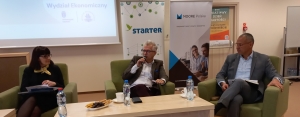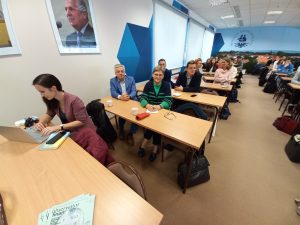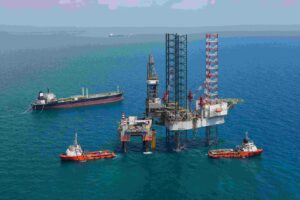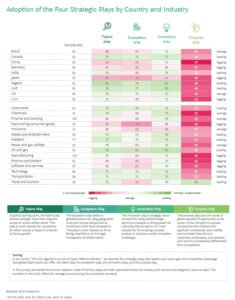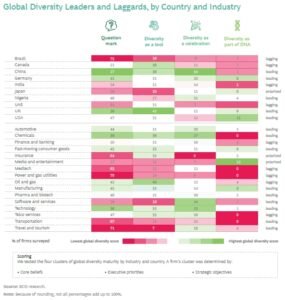Marek Grzybowski (5) questions to Piotr Witek, Managing Partner, President of the Management Board of MOORE Polska
An Exclusive interview to Baltic Journalist Maritime Club of the Baltic Sea & Space Cluster (BSSC)
ESG is important because it integrates environmental, social and governance aspects and this allows companies to operate in a sustainable way, contributing to social well-being, building trust and ensuring long-term success.
Companies are increasingly focusing on ESG issues not only because of social and environmental concerns, but also because of the growing interest of investors, who are increasingly directing their capital towards companies that demonstrate a strong commitment to these areas.
Introducing ESG as a step-by-step process, involving the whole team and skilfully adapting the approach to the specifics of the company in question. Assistance in these areas can help a small company implement sustainability and social responsibility practices more effectively.
Marek Grzybowski: Please, describe the fields in which the ESG is important?
Piotr Witek, Managing Partner, President of the Management Board of MOORE Polska:
ESG (Environment, Society and Governance) has become really important for several important reasons outlined briefly in the following paragraphs:
- Sustainability: The challenges of climate change, poverty, social inequalities and other environmental issues are making sustainability a key priority for society. Companies that focus on ESG issues can contribute to solving these problems and the long-term wellbeing of society.
- Investments in line with values: Investors are increasingly paying attention to sustainable investments. Companies that effectively manage ESG issues are seen as more credible, ethical and long-term oriented. As a result, they are attracting investment from those investors who look not only at profits, but also at positive social and environmental impact.
- Risk and regulatory oversight: Environmental, social and governance activities can affect a company’s reputation and carry legal and financial risks. As a result, more and more regulation is drawing attention to these areas and companies are required to report and act more transparently in line with ESG principles.
- Increased consumer trust: Customers are increasingly paying attention to what values a company stands for before they decide to buy products or use services. Companies that are committed to ESG principles can build stronger relationships with customers who prefer companies that care about society and the environment.
- Long-term performance: companies focused on sustainability and social responsibility are more resilient to changing market conditions. Effective ESG management can contribute to a company’s long-term performance and sustainability.
In other words, ESG is important because it integrates environmental, social and governance aspects and this allows companies to operate in a sustainable way, contributing to social well-being, building trust and ensuring long-term success.
Marek Grzybowski: What does an entrepreneur understand by the acronym ESG?
Piotr Witek, Managing Partner, President of the Management Board of MOORE Polska:
ESG can be translated as ‘Environment, Social, and Governance’. These are the three key areas that companies and investors consider when assessing a company’s sustainability and social responsibility activities and performance.
The interpretation of the terms thus formulated could be as follows:
- Environment (Environmental): Refers to how the company affects the environment. Includes issues such as greenhouse gas emissions, natural resource consumption, waste management and other activities that affect the ecosystem.
- Society (Social): Includes aspects related to social relations, personnel management, employee safety, community engagement, diversity and inclusivity.
- Governance: Deals with the organisational structure, the way the company is governed, transparency, business ethics, compliance with legislation and corporate rules. It also deals with issues related to risk management and stakeholder relations.
Companies are increasingly focusing on ESG issues not only because of social and environmental concerns, but also because of the growing interest of investors, who are increasingly directing their capital towards companies that demonstrate a strong commitment to these areas.
Companies that effectively manage ESG aspects can enjoy better access to capital, greater customer confidence and other long-term benefits.
Marek Grzybowski: ESG reporting covers topics such as recycling, greenhouse gas emissions, other types of air pollution, environmental impact, business ethics, employee health and safety, as well as safety management and accident prevention. What is the role of the audit firm in this process?
Piotr Witek, Managing Partner, President of the Management Board of MOORE Polska:
The auditor’s role in ESG (Environment, Social and Governance) reporting is key to ensuring the integrity, credibility and transparency of the information contained in companies’ ESG reports.
Here are some key aspects of the auditor’s role in this context:
- Verification of information: ESG auditors are responsible for verifying and confirming that the information contained in ESG reports is accurate, comprehensive and in line with accepted standards. This includes checking data on greenhouse gas emissions, natural resource management, social practices, diversity, business ethics and other ESG-related areas.
- Compliance with norms and standards: Auditors verify that companies comply with specific norms and standards for ESG reporting, such as the Global Reporting Initiative (GRI), the Sustainability Accounting Standards Board (SASB), or the Task Force on Climate-related Financial Disclosures (TCFD). Verifying compliance helps ensure consistency and comparability between different companies.
- Evaluation of processes and controls: Auditors assess the processes and controls that the company has put in place to collect, analyse and report ESG data. This includes checking that appropriate data quality controls are in place and that reporting systems are transparent and effective.
- Financial reports and ESG: Auditors also consider the links between financial reports and ESG data. They assess whether there is consistency between financial and ESG information and whether possible risks related to ESG aspects are adequately addressed in the financial reports.
- Provision of audit opinion: Following the audit, the auditor provides an audit opinion on the reliability and trustworthiness of the information contained in the ESG reports. This opinion is important for investors, customers, business partners and other stakeholders as it confirms that the information is trustworthy.
By carrying out these activities meticulously, ESG auditors play a key role in enabling companies to report ESG effectively and build trust among stakeholders. Reliable ESG reporting is becoming increasingly important with the growing importance of sustainability and social responsibility.
Marek Grzybowski: Large companies have created special sections to meet the conditions and prepare ESG reports. How to help small businesses act in accordance with ESG mandates?
Piotr Witek, Managing Partner, President of the Management Board of MOORE Polska:
Implementing ESG of a small company can be beneficial for both the company itself and its stakeholders. Here are some ways you can help a small company implement ESG:
Training and awareness:
-
- Organise training for the management team and employees to raise their awareness of the nature and benefits of ESG.
-
- Awareness of what the key ESG areas are and why they are important for the long-term success of the company.
Risk and opportunity analysis:
-
- Help the company identify potential risks and opportunities related to ESG aspects.
- Conduct a business impact assessment in the context of environmental, social and governance issues.
Development of ESG strategies:
-
- Development of an ESG strategy, tailored to the specific industry and company characteristics.
- Help set ESG goals that are measurable, achievable and in line with the company’s mission and values.
Introduction of reporting standards:
-
- Assist in the implementation of ESG reporting standards, such as the Global Reporting Initiative (GRI) or others appropriate to the industry.
- Provide tools to effectively monitor and report progress in the ESG area.
ESG data management:
-
- Assist in the collection, analysis and management of ESG-related data.
- Help automate data collection processes to facilitate regular reporting.
Partnerships with stakeholders:
-
- Building relationships with different stakeholders such as investors, customers, suppliers and the local community.
- Identify stakeholders’ ESG expectations and help align the company’s strategy with these expectations.
Access to sustainable finance:
-
- Help to identify sources of sustainable finance, such as sustainable funds or programmes that support ESG-compliant investments.
Investor education:
-
- Communicate with investors and demonstrate that the company manages ESG aspects effectively.
- Preparation of relevant ESG materials and information for investors.
Introducing ESG as a step-by-step process, involving the whole team and skilfully adapting the approach to the specifics of the company in question. Assistance in these areas can help a small company implement sustainability and social responsibility practices more effectively.
Marek Grzybowski: Many companies view the auditor as just another controller in the company. Especially small and medium-sized companies that have little staff perceive the auditor this way. Is it possible to create an atmosphere of partnership between the SME and the auditor? How does MOORE do it?
Piotr Witek, Managing Partner, President of the Management Board of MOORE Polska:
This is how this process is possible. It becomes crucial to create an atmosphere of partnership between small businesses and the auditor. This approach is called partnership auditing or audit consulting. In this context, the auditor is not only seen as an auditor, but also as a business partner who helps the company achieve its business goals, identify areas of improvement and adapt to changing market conditions.
Here are some of the concepts that Moore Polska believes will make partner auditing possible:
- Understanding Business:Auditors can invest time in understanding the client’s specific business and business objectives. This allows them to better tailor the audit approach to the company’s specific needs.
- Support in Process Improvement: Auditors can offer tips and suggestions for improving internal processes, risk management and operational efficiency in general.
- Development of the Financial Strategy: Auditors can assist clients in developing a financial strategy, helping to identify areas for investment and achieving long-term financial goals.
- Advice on ESG Issues: Auditors can act as advisors in ESG-related areas, helping companies to adapt to sustainability standards.
- Education and Cooperation: Auditors can play the role of educators, helping clients understand the nature of auditing, the principles of compliance and the benefits of appropriate financial management practices.
- Transparent Communication: An important element of peer audit is transparent communication. Auditors should actively engage in dialogue with clients, jointly solving problems and discussing audit results.
- Personalised Approach: Auditors can tailor their approach to specific client needs, avoiding a one-size-fits-all approach and providing a more personalised service.
Creating an atmosphere of partnership requires commitment from both sides – auditor and client. It is important that the auditor is not seen as just an audit tool, but as a partner who supports the growth and success of the company.
A long-term relationship based on mutual trust and cooperation can benefit both parties.
Marek Grzybowski: Thank you for your answers
